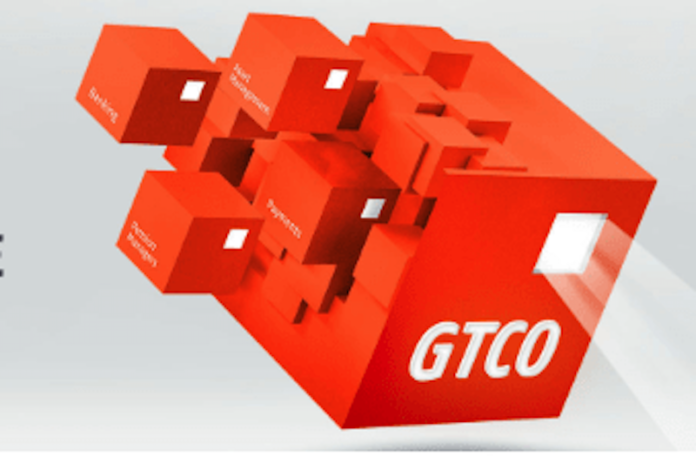The board of Guaranty Trust Holding Company recently published its audited financials for the half-year ended June 30, 2023 indicating robust growth in gross earnings, which was helped by the impressive increase in net interest income and even more significantly leap in other operating income which soared by 2482.5% on the back of foreign exchange revaluations recorded during the period. This rendered ineffective the impact of the equal huge growth in net impairment charge on other financial assets in the period, as well as the almost 100% increase in income tax expenses.
The directors have proposed an interim dividend of 50 kobo, payable to shareholders whose names appear in the register of members as at September 14, 2023, for Ordinary Shareholders and on September 5, 2023, for holders of its Global Depository Receipts (GDR). The register of ordinary shareholders will be closed on September 15, 2023,
while that of GDR holders will be on September 6, 2023. Electronic payment of the interim dividend is scheduled for September 25, 2023.
Gross earnings income jumped from N239.288bn to N672.602bn, representing a 181.1% YoY growth, lifted by corporate banking which contributed N463.6bn, up from N123.255bn in the same period of 2022, followed by N130.354bn from retail banking, compared to the previous N69.651bn; among others. By geography, the lion’s share of the earning was generated in the group’s headquarters- Nigeria, which accounted for N582.401bn, from N173.512bn; and N279.234bn, or the lion’s share of profit before tax, compared to N69.339bn in 2022, trailed from afar by its West African operations that contributed N66.138bn, from which the group derived N38.18bn PBT, up from N29.705bn.
Interest income rose from N134.985bn to N214.617bn; interest income on financial assets fell marginally to N11.328bn in the first half of 2023, from N12.213bn; driven by N129.844bn earned from customer loans and advances, compared to N103.303bn in the previous half-year. Interest expense jumped to N48.487bn from N26.351bn, of which N43.547bn was paid on customer deposits; resulting in net interest income of N177.458bn from N120.848bn.
Loan impairment charges increased significantly from N3.519bn to N82.961bn; as net interest income after loan impairment charges fell to N94.496bn from N117.329bn. Fee and commission income rose slightly to N58.415bn from N54.077bn, lifted by the N21.216bn e-business income, which rose from N18.574bn; while account maintenance charges contributed N10.481bn, compared to N9.436bn in the same period of 2022. Fee and commission expense was equally flat at N6.866bn from N6.713bn, helped by the N5.584bn paid out in bank charges from N4.463bn; resulting in a net fee and commission income of N51.548bn, slightly up from N47.363bn.
Net trading gains on financial instruments dropped to N16.018bn from N23.598bn, after net foreign exchange trading gain dropped from N20.516bn to N13.499bn; just as other income soared from N14.413bn to N372.223bn on the back of a N357.471bn (unrealised) foreign exchange revaluation gain, which soared from N1.868bn. Net impairment charge on other financial assets equal soared from just N543m to N81.313bn; and personnel epenses rose to N20.793bn from N18.539bn. Depreciation and armotisation rose to N19.36bn from N17.345bn; even as other operating expenses increased to N85.421bn from N63.569bn; following which profit before tax stood at N327.397bn from N103.249bn.
Income tax expense rose to N46.915bn from N25.692bn; resulting in net profit of N280.482bn from N77.557bn, translating to earnings per share of N9.94, up from N2.70, but the directors elected to retain the interim dividend payout of 50 kobo.
On the balance sheet, total assets jumped to N8.509tr from N6.446tr at the end of December 2022, lifted by the N2.315tr in customer loans and advances; while total liabilities rose from N5.515tr to N7.309tr; of which customer deposits represented N6.238tr to N4.485tr.
Commenting on the results, a statement by the group quoted its Chief Executive Officer, Segun Agbaje as saying the half-year audited results reflected “the strong business fundamentals underpinning the GTCO franchise, the quality of our past decisions in future proofing our balance sheet for challenging times, and the sound practices that guide our day-to-day operations.”
Despite the challenges in the business environment, notably inflationary pressures and exchange rate fluctuations, he said the group is beginning “to see the gains in the transformation of our businesses following our transition to a Holding Company structure. Improved profitability and a solid performance across key metrics reflect efficiencies and justify the investments we continue to make in technology, product development, and our people.”
GTCO, he continued, recognises “the impact prevailing economic and market conditions have on people and livelihoods and we remain committed to seeking better outcomes for our customers by ensuring that our products and service offerings support our customers and their businesses through their evolving realities, whilst also taking every opportunity to optimise stakeholder value.”
Trending Today
Menu








